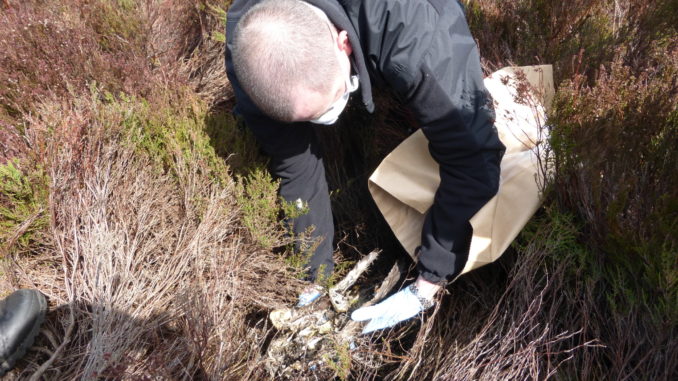
North Yorkshire continues to have the worst record for crimes against birds of prey in the country, with the RSPB calling for an independent review of driven grouse shooting in the country.
The charity says birds of prey are being relentlessly and illegally shot, trapped and poisoned in the county.
Birdcrime 2018 – the only report summarising offences against birds of prey in the UK – reveals 87 confirmed incidents of bird of prey persecution in 2018. 15 of these took pace in North Yorkshire.
All birds of prey are legally protected under the Wildlife and Countryside Act 1981.
Yet in 2018 buzzards, red kites, peregrines and owls were killed illegally.
The report highlights persecution blackspots using data, intelligence and scientific studies. The charity says these are primarily in areas where the land is managed for driven grouse shooting.
During the years 2012-2018, there were 86 confirmed incidents of raptor persecution in North Yorkshire. The second-highest was 26, in the Scottish Borders.
A hen harrier who “suddenly disappeared” in 2018 was found shot dead on a North Yorkshire grouse moor earlier this year
River, a female bird who had been tagged with a satellite transmitter, gave a final location in November from a roost on the Swinton Estate.
In March, a signal was picked up again confirming the bird was dead, with its body found on Ilton Moor in April.
Police confirmed the bird’s body contained two pieces of shot.
Only one person was convicted nationally in 2018. The previous year, RSPB investigations officers saw a gamekeeper shoot and hide two short-eared owls on a Cumbria grouse moor. He was arrested by North Yorkshire Police and later fined £1,210.
Birdcrime 2018 also raises concerns over the environmental impact of intensive grouse shooting.
The burning of carbon-rich habitats increases flood risks and releases CO2 into the air, at a time when the Government has declared a climate emergency.
The RSPB is demanding an independent review of driven grouse shooting and strengthening its calls for driven grouse moors to be licensed.
Mark Thomas, head of investigations UK at the RSPB, said: “The illegal killing of birds of prey has gone on for far too long. Raptor persecution is a stain on our countryside and once again North Yorkshire emerges as the country with the highest number of raptor crimes to its name.
“Current legislation and sentences are proving woefully inadequate and offering absolutely no deterrent to those who want to see birds of prey eradicated from our hills. This culture of criminality in our uplands cannot be allowed to continue.
“Much of the North Yorkshire countryside is dominated by driven grouse moors, which are managed to support little more than red grouse in order to be shot. Burning carbon-rich peatbogs on grouse moors is releasing CO2 into the air, contributing to climate breakdown.
“Urgent and meaningful change is needed to the way our uplands are managed, to put an end once and for all to illegal killing and bring back biodiversity to these landscapes. Enough is enough.”
At the start of the grouse shooting season the Moorland Association, which represents grouse moor owners, said there had been an upsurge of bird of prey success stories in North Yorkshire with merlin, peregrine falcon and hen harriers all successfully breeding on the county’s moorland.
Amanda Anderson, director of the Moorland Association said: “The conservation work that is carried out on grouse moors by owners and gamekeepers is often overlooked in the debate around the start of the grouse shooting season. To see improving breeding success across a range of birds of prey in particular is hugely encouraging and the shooting community are looking forward to building on that in future.”
Speaking about the discovery of the hen harrier on the Swinton estate, Ms Anderson added that the case had distressed the estate’s staff and management.
“The estate has taken great pride in the work it has been doing to encourage and help Hen Harriers and this has resulted in successful winter roosting for several harriers and breeding success this spring.
“Our members, across all these incidents, wish to reiterate their condemnation of all forms of wildlife crime. The estate has asked us to contact the Raptor Persecution Priority Delivery Group to ensure there is as much transparency as possible and to inform them that they are ready to help with any further inquiries that may be made around these events.”


Be the first to comment